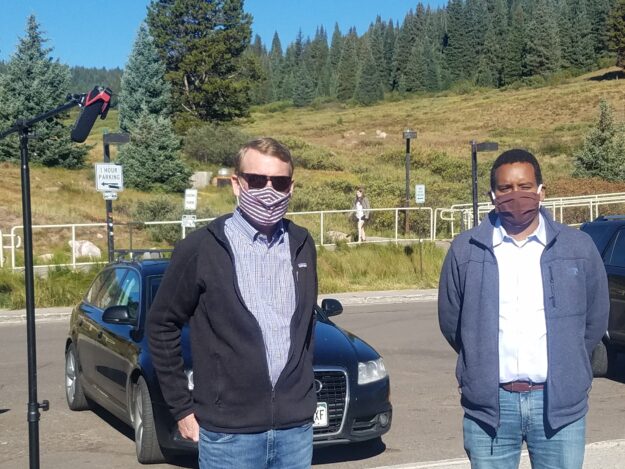Widgetized Section
Go to Admin » Appearance » Widgets » and move Gabfire Widget: Social into that MastheadOverlay zone
Bennet on spending: ‘We’ve borrowed $5 trillion from Chinese to cut taxes for richest people in America’

VAIL – Asked last week at a celebration of a $60 million federal grant for improvements along I-70 on Vail Pass about a long-term solution for Colorado’s chronic transportation infrastructure funding shortages, Sen. Michael Bennet sounded a lot like a man still running for president.
“We’re going to have to have to find a way to pay for it; voters are going to have to decide how to do that,” Bennet said of repeated rejections by Colorado voters of tax increases to pay for upgrading a crumbling highway system. “It’s long overdue with this infrastructure.”
Specifically, Bennet was asked about the estimated $9 billion shortfall the Colorado Department of Transportation often cites just for maintenance and badly needed basic upgrades. He was also asked about CDOT’s oft-cited and alarming statistic that Colorado’s population has increased 53% since 1990 but lane miles for the state’s highway system have increased just 2% since 1990, which also happens to be the year Colorado last upped its gas tax to pay for roads.
“Our parents and grandparents invested in this infrastructure for us. We don’t even have the wherewithal right now to maintain the assets and infrastructure that they were kind enough to build for us, much less build the infrastructure our kids are going to need in the 21st century,” said Bennet, a Democrat who’s been in the Senate since 2009 and ran for president last year.
Bennet, speaking before a small group of Eagle and Summit County mayors and commissioners, then passionately jumped into other areas where he feels Colorado is coming up way short.
“By the way, that’s not the only place where we’re shortchanging the next generation,” said Bennet, the former superintendent of Denver Public Schools. “When you look at our investment in schools today, it’s another example. Colorado – especially rural Colorado – there are a lot of places where we’re paying teachers $33,000 a year. Wyoming’s paying teachers $41,000 a year.
“It’s not sustainable, and at some point we’re going to have to figure out how to generate the revenue to be able to support the things that are critical for us being able to pass this state to the next generation in good shape,” he added. “We have a lot more work to do.”
At that point, U.S. Rep. Joe Neguse, also a Democrat, chimed in that the feds should be doing more to help the states.
“Federal resources can be brought to bear if folks in Washington can muster the political will to get it done,” Neguse said. “We passed in the House three months ago a $2 trillion infrastructure plan that would inure to the benefit of Coloradans [in the form of grants for more transportation and other infrastructure projects] …My hope is that we can get that bill done next year in the United States Senate.” GOP Senate Majority Leader Mitch McConnell called the House legislation “pointless.”
Bennet quickly jumped back in on the topic of federal infrastructure spending.
“When you think about the scarcity that we are confronting in terms of resources, it’s worth asking, ‘What are we spending our money on?’ And the answer to that is that for the last 20 years or so we’ve borrowed about $5 trillion from the Chinese to cut taxes for the richest people in America,” Bennet said, looking at the gathered local politicians.
“If any one of these mayors said, ‘I’m going to borrow more money for Vail or Avon than I’ve ever borrowed before,’ and you said, ‘Well, what are you going to spend the money on? Are you spending it on water? No. Are you spending it on infrastructure? No. Are you spending it on schools? No. Open space? No. Affordable housing? No. Mental health? No.’ All of these issues that are so important for these communities, and the answer is ‘No, we’re going to give it to the two richest neighborhoods in town.’ They’d be run out on a rail. But that has been the federal tax policy for 25 years and we’ve got to change it and I think we will and begin to invest in this country again,” Bennet said, pointing out the last decade was the time to do it.
“We’ve had interest rates that have been basically 0% for the last 10 years,” Bennet said. “We should have been borrowing money to invest in infrastructure at 0% interest rates because infrastructure just gets more expensive later if you don’t build it now. I would have been willing to borrow money to do that as opposed to borrowing money to give tax cuts to people that really didn’t need it. Those are the kinds of changes we need to make.”
The signature legislative accomplishment of President Donald Trump’s administration has been the 2017 Tax Cut and Jobs Act, which has been widely criticized for increasing income inequality and ballooning federal deficits. Trump has been promising for nearly four years to deliver an infrastructure package but has yet to produce.
Meanwhile, the United States — in a recent quality of life study on social progress — dropped from 19th in the world in 2011 to 28th in 2020.
David O. Williams
Latest posts by David O. Williams (see all)
- The O. Zone: Bold Colorado sports predictions for remainder of 2024 - November 18, 2024
- Lindsey Vonn set to rejoin U.S. Ski Team - November 14, 2024
- Rail company eyeing Eagle County service no longer involved in Utah oil train proposal - November 13, 2024


